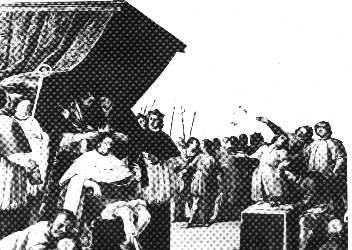Taking advantage of strong disagreements inside Germany, the Italian feudatories rebelled and, in 1002, they elected Arduino, Marquess of Ivrea, king of Italy. He distinguished himself particularly because of his fights against the Bishop-Count of Ivrea, Varmondo.
The Emperor Henry II came to Italy and in 1004 he defated Arduino, who was not helped, as he hoped, by many feudatories of northern Italy. Soon later, however, Arduino succeded in establishing new and stronger alliances, so that he was able to withstand a long siege, forcing Henry II to leave Italy. But King Arduino's kingdom was tormented by the frequent quarrels among his feudatories.

Arduino's coronation; fresco by G.P. Recchi in the castle of Aglič.